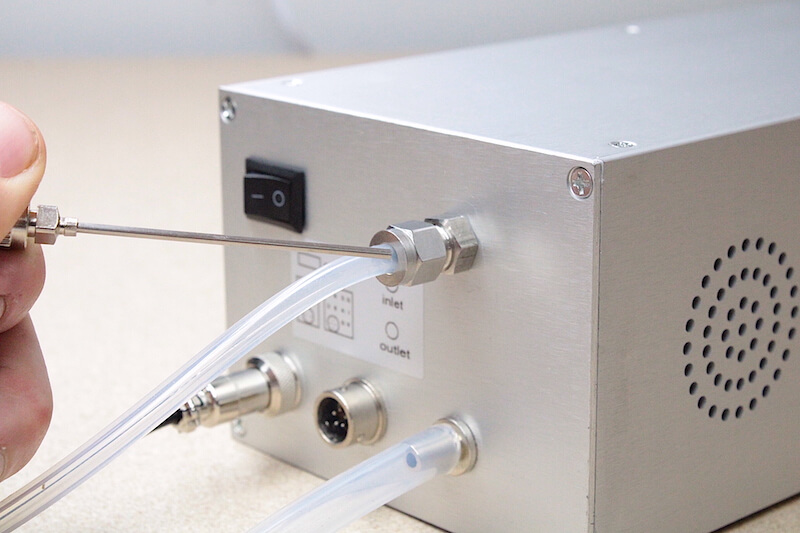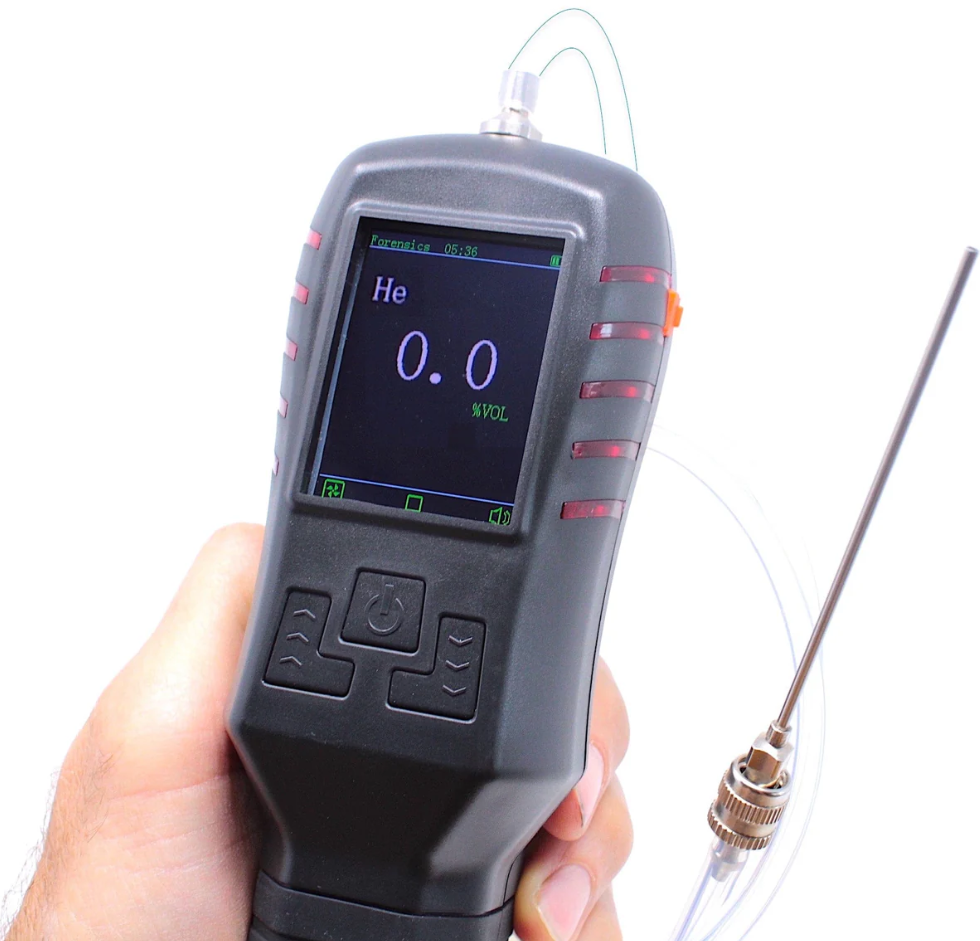Helium leak detectors are a crucial tool that are used in identifying and locating small leaks. These instruments detect the presence of helium, an ideal gas for leak detection due to its small atomic size and rare presence in the ambient atmosphere. By introducing helium into or around a system and measuring its presence outside, helium leak detectors ensure the integrity and safety of systems where even minor leaks can have significant consequences. Widely used in industries such as aerospace, automotive, semiconductor manufacturing, welding, diving, rocket propulsion, cryogenics, MRI, processing, meteorology, and research & development.
Pros |
Cons |
|
✅ Helium is special gas. It is light, small inert and a scarce gas ✅ Helium leak detectors are used to detect helium content in a gas mix or helium gas leak ✅ Helium leak detectors are useful for welding, rocket propulsion, cryogenics, MRI, meteorology and research and development |
⛔ Helium gas leak detectors vary in large price scale $100s to $10,000s (depending on sensitivity) ⛔ Critical to understand the application to ensure correct gas detector selection, range and lowest level of detection ⛔ Difficult gas to measure, requires use of specialized thermal conductivity sensors |
What Is The Best Helium Analyzer?
Helium gas analyzers are used to analyze gas mixes for breathing, trimix scuba, compressed gas, industrial applications, welding, and research & development. Most helium gas analyzers detect from 0-100% helium content in air with a 0.1% resolution. A few reputable Helium Gas Analyzer options include:
-
Forensics Detectors Helium Leak Detector (Purity% and Leak): This detector is renowned for its high accuracy in detecting helium purity and identifying leaks in various applications. It is particularly useful in environments where maintaining precise helium purity is critical, as well as in pinpointing small leaks in complex systems.
-
Bacharach's He Helium Analyzer (Process Control): Designed for robust process control applications, this analyzer excels in continuously monitoring helium concentrations in industrial processes. Its durability and precision make it an ideal choice for long-term operations in challenging industrial environments.
-
Eaton Helium Gas Analyzer (Process Control): Eaton's analyzer is tailored for efficient process control, ensuring optimal helium gas levels in manufacturing and industrial settings. It features advanced sensor technology, offering reliable performance and quick response times in dynamic process control applications.
-
Nuvair's Pro He Alarm Analyzer (Breathing Gases, Diving): This device is a crucial tool for divers, providing accurate measurements of helium content in breathing gases. Its alarm feature enhances safety by alerting users to helium levels that may be unsafe for diving applications.
-
Divesoft Helium Analyzer (Breathing Gases, Diving): Divesoft's analyzer is specifically designed for the diving industry, offering precise helium measurements in mixed breathing gases. It is user-friendly and robust, making it a popular choice among professional and recreational divers alike.
-
Analox Helium Analyzer (Breathing Gases, Diving): This analyzer is highly regarded in the diving community for its accuracy in measuring helium concentrations in breathing gases. It is compact, easy to use, and provides divers with critical information for safe underwater exploration.
-
Analytical Instruments Helium Analyzer (Diving): Tailored for the diving industry, this analyzer helps divers monitor the helium content in their breathing gases. Its precision and reliability make it an essential tool for ensuring the safety and efficiency of diving operations.
What is the Best Helium Leak Detector?
These analyzers are used with a probe to detect helium leaks in various equipment, vacuum equipment, spectrometers and cryogenics. Since helium is light, it is a excellent tracer gas and can penetrate leaks or compromised seals to then be detected and ultimately find a leak. Some reputable options include:
- GL Sciences Helium Leak Detector
- Ion Science Helium Gas Leak Detector
- Infinicon Helium Leak Sniffers
- Nolek Helium Sniffer
- Forensics Detectors Helium Analyzer (Generic)
Why is Helium Used in Trace Gas Leak Detection?
Helium gas is very small and light making it a great carrier gas for leak detection. It is also inert so it will not react with any materials. While helium is commonly known for its use in party balloons, it plays a significant role in various industrial settings. Helium gas is widely used in applications such as welding, diving, rocket propulsion, cryogenics, MRI, processing, meteorology, and research & development.
Who Uses a Helium Leak Detector?
A helium leak detector is used by various industries to detect and locate small leaks in systems and components. Some of the industries that commonly use helium leak detectors include aerospace, automotive, HVAC, refrigeration, and semiconductor manufacturing. These industries use helium leak detectors to ensure that their systems and components are leak-free and functioning properly. Helium leak detectors are also used in research and development laboratories to test the integrity of vacuum chambers and other equipment.

What about Helium Gas Calibration?
Is Helium Flammable?
No it is not. Helium is typically regarded as a fairly safe gas. In fact, it is frequently used to fill balloons at parties and events.
How do I use the Helium Leak Detector?
- Using the helium leak detector is a simple process. To begin, turn the analyzer on and allow it to start operating after its countdown.
- If you are undertaking leak detection, install the tubing and needle. Make sure there are no blockages.
- Undertake a quick bump test to build confidence the analyzer is functional. Here we are assuming the analyzer is within the calibration period, so we are set to go. Otherwise, get the unit calibrated if you are serious about absolute best practices for maximum sensitivity and accuracy.
- Once bump tested, take the probe and scan the area of interest. Move about 2 seconds per inch. Be patient to ensure you capture any leaking helium gas.
How Long Does the Helium Gas Sensor Last?
The good news is that the Helium Leak Detector has a solid-state thermal conductivity sensor. These sensors last between 6 to 10 years and sometimes even longer. In other words, thermal conductivity sensors last much longer than traditional electrochemical gas sensors which have a life between 2-3 years.
How Should I Store my Helium Leak Detector?
The Helium Gas Leak Detector should be stored at moderate humidity and temperature. Ideally humidity at 50%RH and at room temperature at about 70F. Store the unit in the hard waterproof case that the unit is sold with. Moderate storage temperature will ensure to maximize the life of the sensor and also ensure accurate measurements when you go to turn on the unit for operation.
Can You Smell Helium Leaks?
No, helium is an odorless, inert gas that humans cannot detect through smell. Special electronic detectors are required to identify helium leaks in laboratory environments.
Does Helium Leak Out of Tanks?
Helium tanks are often used to transport helium gas from one location to another. In these tanks, the helium should not leak out unless the valve has not been properly closed. As such, it is imperative to make sure to tighten the valve shut after using the helium.
What Are Some Common Methods for Helium Leak Testing a Vacuum System?
When helium leak testing in the presence of a vacuum system, there are two major methods used: integral testing and local testing.
Integral Testing
Integral testing takes place when the sample is under pressure/vacuum and is also in a vessel. The sample is either evacuated or placed into a vacuum, so it is sometimes referred to as a helium vacuum test.
Local Testing
Local testing takes place when the sample is under pressure/vacuum but is not in a vessel. The sniffed or pumped gas is passed to a mass spectrometer for a reading.
Conclusion
- Helium Leak Detectors are used to detect helium gas leaks in specific applications such as MRI, welding, rocket propulsion, cryogenics, meteorology, and research and development
- Helium leak detectors are also called helium gas sniffers, helium gas analyzers, and helium gas testers.
- Helium Leak Detectors are not cheap. They are expensive items.
- Helium Leak Detectors are not purchased daily, so make sure you are well-educated and know exactly what you are getting.
About The Author
Dr. Kos Galatsis ("Dr.Koz") is the President of FORENSICS DETECTORS where the company operates from the scenic Palos Verdes Peninsula in Los Angeles, California. He is a subject matter expert on gas sensor technology, gas detectors, gas meters, and gas analyzers. He has been designing, building, manufacturing, and testing toxic gas detection systems for over 20 years.

Every day is a blessing for Dr. Koz. He loves to help customers solve their unique problems. Dr. Koz also loves spending time with his wife and his three children going to the beach, grilling burgers, and enjoying the outdoors.
Read more about Forensics Detectors here.
Email: drkoz@forensicsdetectors.com

